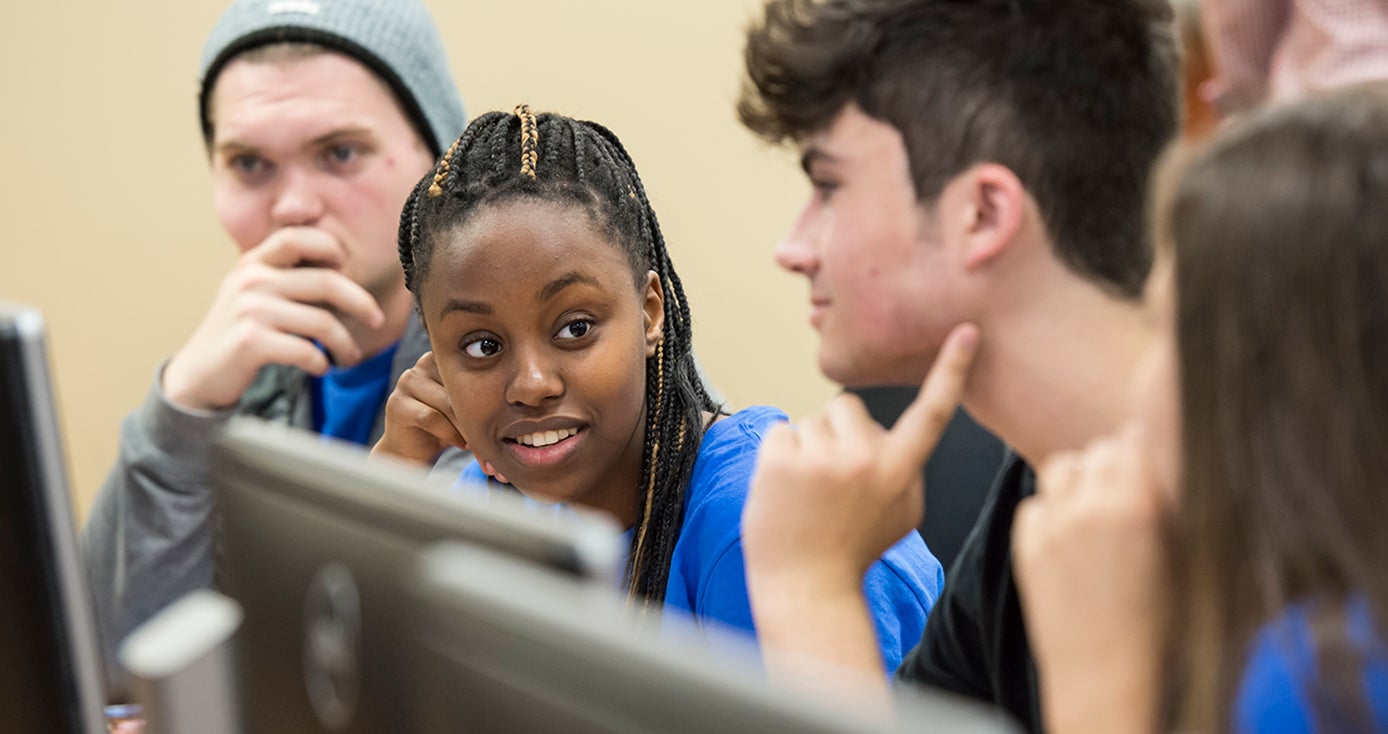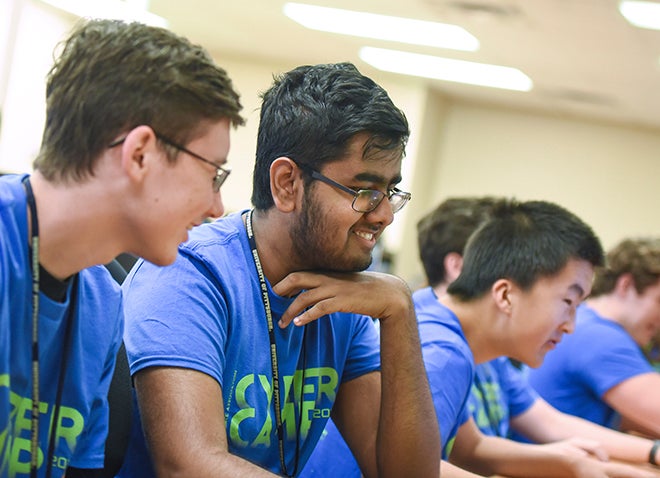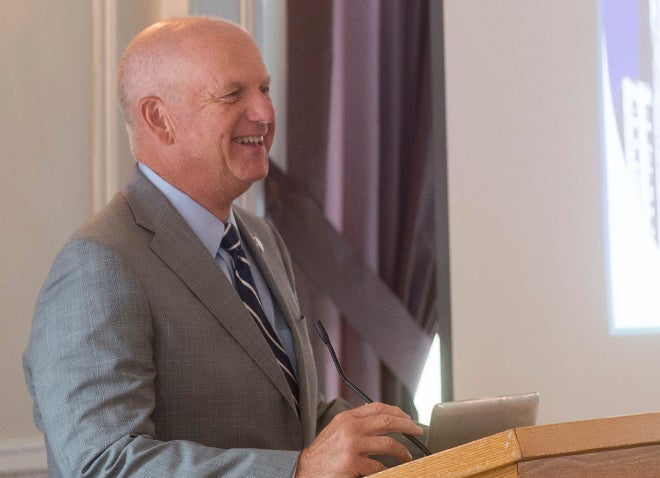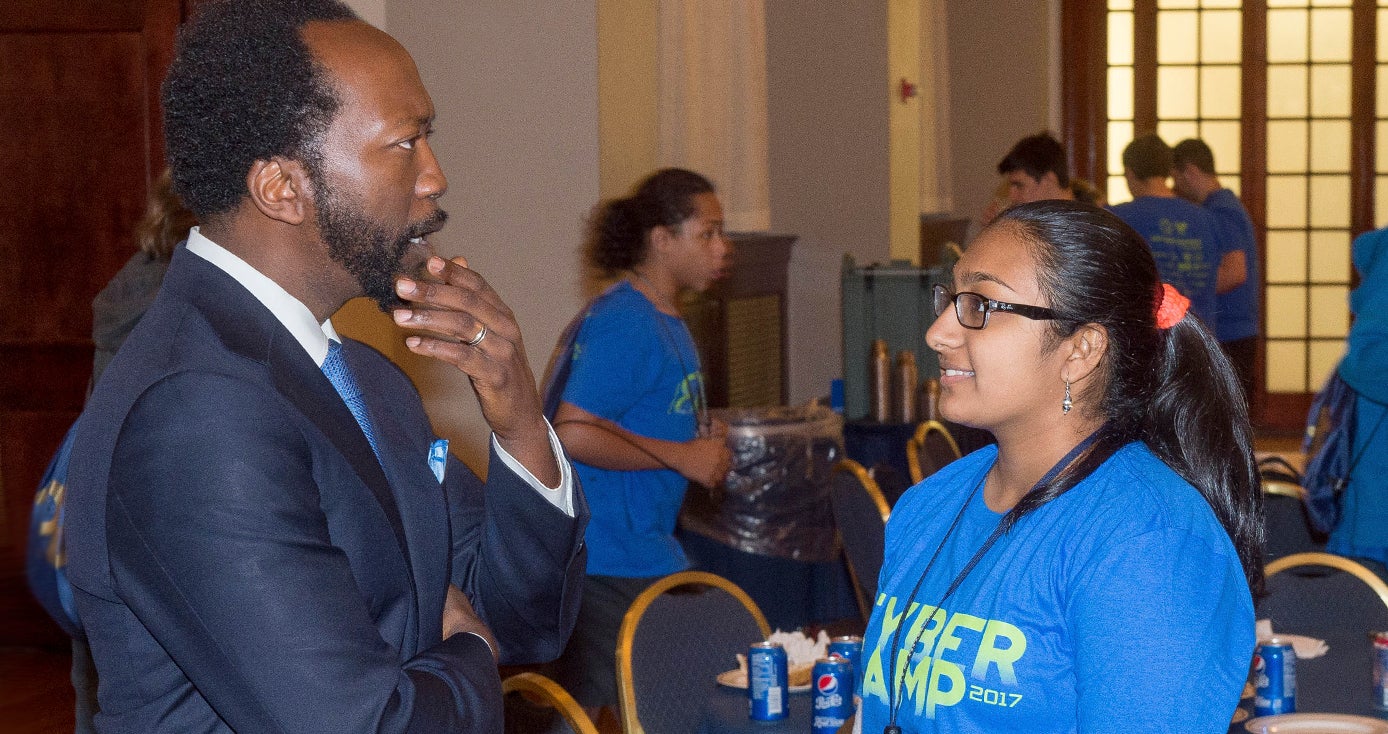
Subscribe to Pittwire Today
Get the most interesting and important stories from the University of Pittsburgh.Securing Cyberspace: High Schoolers Learn What It Takes to Fight High-tech Threats
With her gaze firmly on the computer screen in front of her, 16-year-old Ndunge Mulwa tells her teammates that their computer network still isn’t secure, even after blocking user access to entertainment programs.
“It’s time to start thinking about changing the password settings and limiting all admin authorizations, companywide,” she said with a sigh.
Fellow students sitting on either side of Mulwa, who's a senior at Kiski Area High School in Westmoreland County, offer their perspectives on the pros and cons of her proposed move. A tense silence looms. Time is not on their side. The digital timers in the front and back of the computer lab count down, reminding them that they have less than one hour before the end of the 2017 CyberPatriot mini-competition at the Air Force Association (AFA)’s CyberCamp at Pitt.
In the competition’s fictionalized scenario, each of 47 teams serve as cybersecurity experts for a large corporation. Teams receive points for making their organization’s network more secure. They lose points for jeopardizing the system or leaving it open to vulnerabilities.
Mulwa and teammates Zavier Keller of Freeport Senior High School, Shane Ross of Kiski Area High School and Madison Borkovich of Fox Chapel Area High School, huddle to discuss the matter using technical language well beyond what most teenagers know. Eventually, they go for Mulwa’s suggestion and are elated to find the move has earned them 10 additional points. Their celebration is short-lived, however; constant vigilance is required in the world of cybersecurity.
The competition was the culminating event of CyberCamp. The five-day series of classes, speaker engagements, team-building exercises and workshops held on Pitt's campus are part of an ongoing national effort by the Air Force Association to inspire young Americans to pursue careers in the cybersecurity field.
“The very future of the United States is tied to how well our society adapts to a technology-enhanced world,” said Pitt Chancellor Patrick Gallagher, who once directed the National Institute of Standards and Technology and served on then President Barack Obama’s Commission on Enhancing National Cybersecurity. “Training young people to be America’s first and best line of defense against cyber threats is an essential aspect of ensuring our nation’s safety and continued leadership on the world stage.”
“Western Pennsylvania happens to be the citadel for all things cyber,” said David J. Hickton, a former U.S. Attorney for the Western District of Pennsylvania and the founding director of the University of Pittsburgh Institute for Cyber Law, Policy, and Security, which oversaw the camp. “Some of the most skilled cyber professionals in the nation can be found right here in Western Pennsylvania. It is only fitting that the most in-depth session of the AFA’s CyberCamp program take place at the University of Pittsburgh.”
The CyberCamp at Pitt — the only 2017 location in Pennsylvania — attracted more than 200 regional high school students from nearly 60 area public schools. Participants were trained by instructors from various University divisions as well as such entities as the Carnegie Science Center and the National Cyber-Forensics & Training Alliance.
Keynote speakers included Christopher B. Howard, president of Robert Morris University; Audrey Russo, president and CEO of the Pittsburgh Technology Council; and Soo C. Song, acting U.S. Attorney for the Western District of Pennsylvania. Speaking on behalf of Pitt, Gallagher, Hickton and School of Law Dean William M. Carter Jr. offered personal insights and professional advice.
In his opening remarks, Hickton noted that the cybersecurity field presents tremendous career opportunities for America’s young people.
“There can be no doubt that the future is bright for vibrant, young professionals who possess the drive to master the unique set of skills this profession requires,” he said. “This week of training serves as an excellent first step towards a career in cybersecurity, defending the computer systems of anyone from Facebook to the FBI.”
The sentiment of Hickton’s words was reinforced throughout the week. According to presentations delivered during the camp, more than 200,000 cybersecurity jobs in the U.S. went unfilled in 2015, and the demand for trained professionals is expected to rise by 6 million by 2019 globally with a shortfall of 1.5 million. Industry experts predict there will be more than 3 million cybersecurity job openings by 2021. There also are wide disparities in the cybersecurity field for women and minorities. A 2015 report showed women make up just under 20 percent of information security analyst jobs while African-Americans, Asian-Americans and Hispanic-Americans compose less than 12 percent of the field.
Mulwa came to Pitt’s CyberCamp in the midst of considering college majors. She has been involved with a wide range of activities throughout her high school career, including Kiski’s band, engineering club, robotics team and the school’s chapter of the Future Business Leaders of America. She referred to her CyberCamp experience as “eye-opening” in terms of the types of opportunities that will be awaiting when she eventually enters the job market.
“Thinking long term, I’m most likely to be doing something related to computer science or engineering, but I think it’s important to have an open mind and explore the environment around you,” said Mulwa, who is looking forward to entering college — possibly Pitt — in the fall of 2018. “Regardless of what career field or school I eventually do choose, information technology and cybersecurity will almost certainly play some role in that profession, and this has been an interesting and informative experience.”
Those who missed the Air Force Association CyberCamp can participate in the CyberPatriot National Youth Cyber Defense Competition for middle school and high school students.
In the competition, teams act as cybersecurity professionals challenged to defend and strengthen virtual computer networks and systems. Top teams in the nation earn all-expenses-paid trips to Baltimore for the national finals competition, where they can earn national recognition and scholarship money.
The cost is $205 per team, and fees are waived for all-girl teams and teams from Title I schools, Junior Reserve Officer Training Corps, Civil Air Patrol and U.S. Naval Sea Cadet Corps.
To find more information and to register a team, visit www.uscyberpatriot.org.





